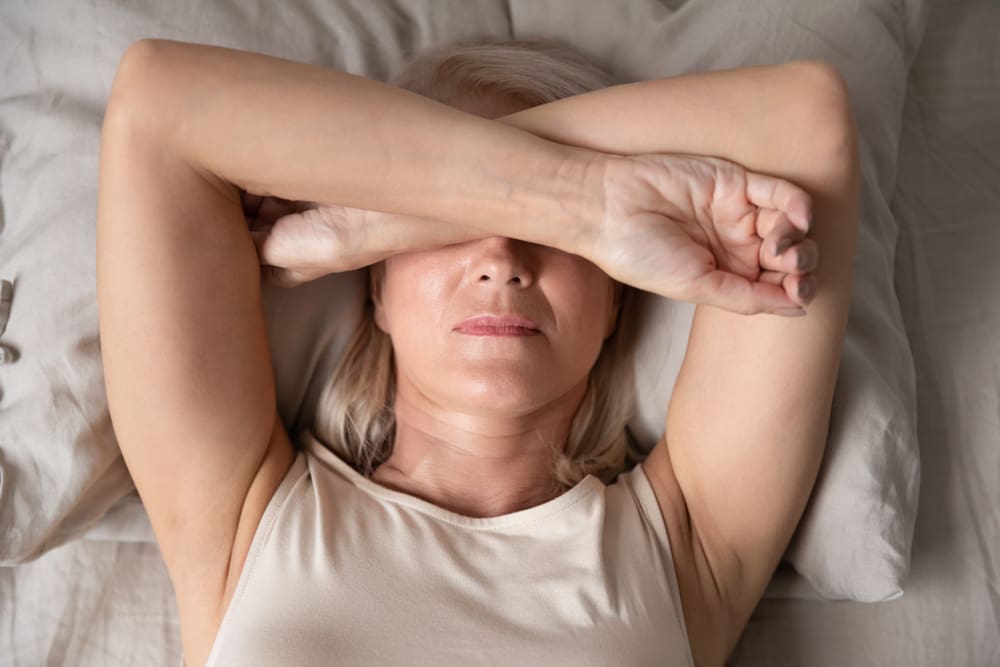Insomnia, hot flushes, mood swings, brain fog…who wouldn’t reach for a glass of wine when faced with a barrage of uncontrollable, and incredibly unpleasant, symptoms. But the regular tipple that’s helping you sleep, feel calm and manage your untamed emotions could be doing you more harm than good. The biological changes that happen in a woman’s body after child-bearing years mean that menopause and alcohol can be a harmful combination.
Delamere wellness retreat in Cheshire is no stranger to helping women find better ways to cope with the menopause. It’s common that people who are already moderate-to-heavy drinkers become even more dependent on alcohol during the onset of perimenopause symptoms. The danger arises when a psychological alcohol addiction becomes a physical one and the problem becomes harder to treat. Understanding how menopause and alcohol impact your body will help you to make informed choices and get professional help if you need it.

Worried about menopause and alcohol? Speak to the team at Delamere
What happens to the body during menopause?
When a woman has stopped having periods for at least 12 months she is classed as being in menopause. However, it’s the well-known symptoms that happen in the months and years leading up to this point, the perimenopause, which marks the beginning of hormonal changes. As the ovaries gradually stop working and releasing eggs, levels of estrogen and progesterone fluctuate, which has a variety of recognised side effects, such as:
- Headaches
- Mood swings
- Anxiety
- Depression
- Brain fog
- Hot flushes
- Night sweats
- Insomnia
- Aching joints
- Frequent urination
- Stomach cramps
- Incontinence
- Loss of libido
After menopause, women may find they tend to gain weight, experience skin problems due to depleting levels of collagen, and become more susceptible to developing long-term health conditions, such as osteoporosis and heart disease. Not all women will experience these symptoms, but for those who struggle, drinking alcohol to excess can seem like an easy means of escape.
Does alcohol make menopause symptoms worse?
Menopause is an incredibly challenging period in a woman’s life. Tying to juggle work and home life while experiencing debilitating, and often embarrassing, symptoms can fuel mood disorders which are linked to substance abuse. While reaching for the bottle may help to temporarily alleviate stress, drinking alcohol can actually exacerbate symptoms.
Menopause, alcohol and night sweats
Along with caffeine and spicy foods, alcohol can cause spikes in temperature, making night sweats worse. This is because blood vessels dilate as the heart rate speeds up causing the skin to feel flushed and encouraging the release of sweat. Drinking alcohol close to bedtime can make night sweats even more unbearable for menopausal women.
Menopause, alcohol and sleep disturbance
Menopause and alcohol aren’t great bed fellows. Being drenched in sweat and getting up in the night to pee more frequently are common irritations of hormonal changes. But alcohol can make your chances of a good night’s sleep even slimmer. Not only is alcohol a diuretic – causing you to need the toilet more – it also affects your circadian rhythm and hinders your ability to achieve a deep sleep.
Menopause, alcohol and mood problems
During perimenopause women are particularly susceptible to developing depression, especially if they have experienced it before. This is because a drop in estrogen levels leads to reduced serotonin and affects the pleasure receptors in the brain. As we know, alcohol is also a Central Nervous System (CNS) depressant, which means if you’re already feeling low due to hormonal changes, having a drink is only going to make things worse.
Menopause, alcohol and other health conditions
In tandem with the menopause, drinking a lot of alcohol over a long period affects bone density and increases your chances of developing osteoporosis later in life. This is a degenerative condition that causes bones to become weak and makes you more prone to fractures and breaks. Drinking alcohol is also linked to certain cancers. In a five-year study, post-menopausal women who increased their alcohol intake were found to be at greater risk of breast cancer (1).
Menopause, alcohol and ageing
Over the last ten years, rates of Alcohol Use Disorders (AUDs) have risen by 84% in women, in comparison to just 35% in men. Which is especially worrying as women experience greater health-related consequences from alcohol abuse than men and these problems are compounded as women age (2).
Regardless of sex, we all break down alcohol in our systems more slowly as get older. This is worse for women going through the menopause, as an increase in body fat means that alcohol is more concentrated, and toxins can stick around longer to do more damage (3).

Forgetfulness is a natural part of ageing, too, but throw menopause and alcohol into the mix and you’ll understand why you’ve suddenly started putting your keys in the fridge. Approximately two-thirds of women report the inability to think clearly during perimenopause but this usually restores itself after the menopause. In contrast, drinking alcohol affects cognitive function instantly as well as in the years following heavy use.
As women age, their tolerance to alcohol also weakens, due to the liver reducing the ability to break down and metabolise alcohol. This can lead to more intense headaches, which are already a common menopause symptom.
If you’re concerned that the stresses of the menopause are making you drink more and recognise any of these symptoms worsening in yourself, please do get in touch and find out how we can help.
Quitting alcohol during the menopause
It’s easy to slip into unhealthy habits with alcohol, especially when life is full of extra stresses. The menopause typically happens in a woman’s life when multiple unsettling changes are occurring, whether it’s children flying the nest or elderly parents demanding more of your time. Here are a few things you can try yourself to reduce your reliance on alcohol during the menopause:
- Set yourself a daily alcohol limit
- Have a few alcohol-free days per week
- Spread your units out to avoid binge drinking
- Drink a glass of water in between each alcoholic drink
- Find another calming outlet – yoga, reading or meditation
- Eat a healthy nutrient-dense diet
- Take regular exercise to improve your mood
If you feel like your drinking is getting out of hand it might be time to talk to someone. Quitting alcohol alone following months or years of heavy use is dangerous and can also exacerbate menopause symptoms, such as night sweats, insomnia, anxiety and depression.
How can Delamere help with menopause and alcohol addiction?
Delamere is the UK’s first purpose-built retreat specialising in treatment for menopause and alcohol addiction. Our setting on the edge of Cheshire’s largest forest is the perfect place to relax, refocus and begin your recovery. If you have developed a reliance on alcohol during perimenopause, we can help you avoid unpleasant side effects with a clinical alcohol detox.

While the menopause needs to take its natural course, we can help you during the transitional phase with tailored medication, targeted therapy and nutritional support. Our holistic therapists offer a range of treatment options to help improve your mental and cognitive health, from meditation and breathwork to music, art and equine therapy.
We can treat both the mental and physical impact of menopause and alcohol addiction by focusing on your needs as a whole and understanding what role each factor plays in your life at home. Following our unique three-stage approach you will learn how to cope with the menopause without relying on alcohol and look forward to living again.
If you’re struggling with the menopause and alcohol addiction, call us confidentially to speak to a member of the team today. Contact Delamere
References
1. Dam M K, Hvidtfeldt U A, Tjønneland A, Overvad K, Grønbæk M, Tolstrup J S et al. Five year change in alcohol intake and risk of breast cancer and coronary heart disease among postmenopausal women: prospective cohort study BMJ 2016; 353 :i2314 doi:10.11.
2. Peltier, M.R., Verplaetse, T.L., Roberts, W. et al. Changes in excessive alcohol use among older women across the menopausal transition: a longitudinal analysis of the Study of Women’s Health Across the Nation. Biol Sex Differ 11, 37 (2020). https://doi.o.
3. https://www.drinkaware.co.uk/facts/health-effects-of-alcohol/alcohol-and-gender/alcohol-and-women.






